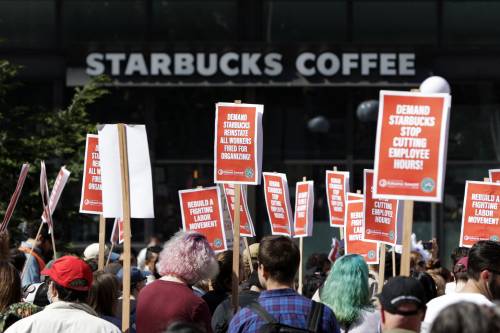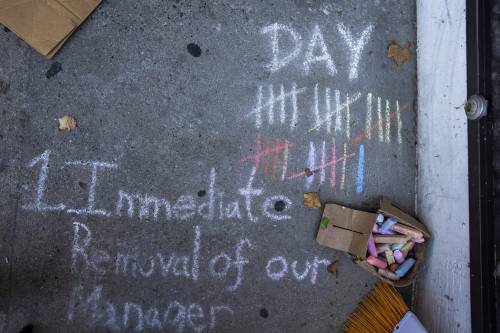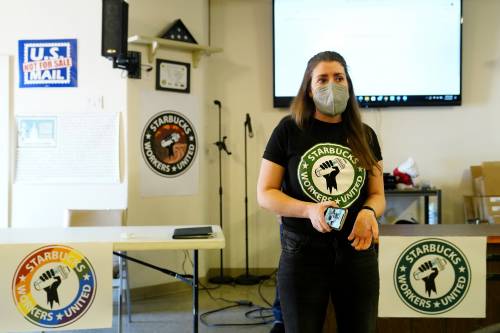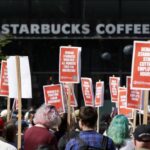
This story is part of a group of stories called

Uncovering and explaining how our digital world is changing — and changing us.
Workers at a Starbucks right outside the University of Texas campus in Austin filed to unionize in March and won their election by a landslide in June. It’s now nearing the end of August, and union workers say their requests to begin bargaining for a contract have largely been ignored by Starbucks.
Some workers believe the coffee company is using these delays as one of many union-busting tactics meant to prevent workers from exercising their right to organize: The longer it takes to create and agree on a contract with the company, the longer it will take for union workers to actually enjoy the benefits of being in a union and the more likely the union movement will lose momentum.
Delays are especially acute at Starbucks. Since the Austin store filed to unionize, for example, about half of the workers there have left. The turnover at that location is always high since many of its workers are young college students, who typically graduate and find higher-paying jobs. The food service industry is also notoriously transient: People don’t usually stay at any given job for long.
That’s why members of the national union, Starbucks Workers United, say the company is making a difficult situation worse. They accuse the company of firing workers who were outspoken for the union and forcing others to quit with unfair scheduling. Workers in Austin say the company is no longer hiring back students returning from summer break, who used to be given priority. The idea, workers say, is to dilute the union effort with new employees, who may not be as supportive or aware of the union, making it even harder to organize and establish a contract.
“It is taking longer than we would like, longer than we had hoped, and longer than it logically and decently should,” Lillian Allen, a barista at that Austin Starbucks, told Recode. “But to expect logic and decency from a large corporation in America is an act of folly.”
The Starbucks store in Austin isn’t the only one facing bargaining delays. Of the more than 220 locations nationwide that have voted to unionize since December, only three have made it to the bargaining table to discuss a contract with Starbucks.
Many of those who fought to unionize these Starbucks stores have already left the company. Since Recode reported on the union movement in April, a number of the workers featured in that article are no longer working at Starbucks. One got a job as a teacher; one says she was fired for union organizing, although the official reason was tardiness; and another left because she couldn’t take how the company was treating workers.
Starbucks spokesperson Reggie Borges told Recode that claims of delay tactics are false. “From the beginning, we have been clear that we will respect the process and bargain in good faith with the stores that vote for union representation,” he said. Borges added that, as of August 1, the company has “engaged or responded to demands to bargain with a majority of the stores and are working through additional requests.”
Workers have said that the company’s responses, when they’ve gotten them, have been vague and noncommittal. Last week, the National Labor Relations Board (NLRB), the federal body that oversees union elections, issued a complaint against Starbucks for “failing and refusing to bargain collectively and in good faith” with workers at its Roastery in Seattle. A complaint means that the NLRB investigated the union charge and found merit. After the NLRB issued a separate formal complaint in April, it took the company to federal court, where a judge last week ordered Starbucks to reinstate union workers in Tennessee the company had fired in retaliation for organizing.
“You’re not bargaining in good faith if you’re not bargaining”
Starbucks Workers United has also filed an unfair labor practice charge against Starbucks on behalf of stores nationally, saying the company has failed to bargain. The NLRB is currently investigating. In a related letter, the union has asked the company to select dates and times between August 22 and September 23 to begin bargaining. After being contacted by Recode about the bargaining delays, Starbucks responded to the union but failed to provide a date to meet.
So far, the union has filed a total of nearly 300 unfair labor practice charges against Starbucks, and the NLRB has issued more than 20 complaints. These processes, however, are time-consuming and the NLRB’s remedies are hard to enforce, so the union is trying a lot of other tactics to get Starbucks to bargain and eventually agree on a contract.
According to some labor experts, union contract bargaining should only take about a year. But it’s now apparent that, at the current pace, negotiations between Starbucks and its unionized employees could take much longer.
“It’s certainly in the interest of the employees and the union to start bargaining as soon as possible,” said Risa Lieberwitz, a labor law professor at Cornell University’s School of Industrial and Labor Relations and academic director of its Worker Institute. “Unfortunately, where there’s a company that’s been hostile to unionization, as Starbucks has been, it’s pretty common to see some delays before bargaining gets started.”
“We will make Starbucks give them a contract”
The options workers can pursue to speed up the process are limited. The NLRB can rule that a company is not bargaining in good faith and order it to do so. However, if Starbucks doesn’t comply, there’s little the NLRB can do to enforce that decision other than taking the company to federal court — a process that’s even more time-consuming.
Because of these challenges, Starbucks union workers plan to up the ante. Since January, the Starbucks Workers United has already held about 80 strikes, with 55 of those happening this summer, the union told Recode. That means about a third of all unionized Starbucks have gone on strike. Though many of these strikes were over things like unfair firings and closing union stores, union workers say that future strikes will be over bargaining and contracts, citing a long list of Starbucks delay tactics, ranging from misdirection to old-fashioned taking their sweet time. The company, again, has denied doing so.

And while the journey to a contract is arduous, Starbucks workers are well aware of the uphill battle they face and that they may not be at the company long enough to benefit from a union contract. But, they say, the fight has never been just about them.
“We’re not just fighting for the baristas who are here now,” Allen said. “We’re fighting for all the baristas who will come after because we want this to be as good of a place to work as we know it can be.”
Starbucks is delaying union bargaining
It can be difficult to decipher who is exactly at fault for delaying bargaining, since the Starbucks union’s account of the process so far and that of the company are at odds with each other. What experts say, however, is that the union has every reason to want to bargain while Starbucks has every reason not to.
“They’re grasping at straws. They’re trying every delay tactic that they can think of,” Rebecca Givan, associate professor at Rutgers University’s labor school, said of Starbucks. “You’re not bargaining in good faith if you’re not bargaining.”
Representatives from the three stores that have begun bargaining, two in the Buffalo area and one in Mesa, Arizona, say that Starbucks is applying delay tactics there as well.
Michelle Eisen, a barista at the first unionized Starbucks in Buffalo and a member of the Starbucks Workers United national bargaining team, said the company has met to bargain about a half dozen times since their first meeting in January, but the two parties have made little progress. The initial bargaining session was largely wasted, Eisen said, as the company presented a list of ground rules she felt were meant to kill time, including “no screaming” and “no slamming hands on the table.” The meetings are held on zoom.

In general, Eisen said, the company will hear a union proposal, not really engage with it, and then request time to discuss it on their own before punting negotiations to the next meeting. Since this has happened over and over, she said, the delays have become excessive. She added that while the union has presented more than 10 proposals, the company has not engaged those seriously and hasn’t come to a tentative agreement — a building block for creating a contract — on any of them.
“You’re supposed to present these proposals, and then there’s a back and forth and the company says, ‘Okay, we like this part of this proposal,’” Eisen said. “None of that happened.”
Meanwhile, Starbucks has only made one proposal: a manager’s bill of rights. Eisen said the proposal was pretty much a repeat of the company’s handbook; Starbucks declined to comment on the specifics of the negotiations.
“We’re not just fighting for the baristas who are here now. We’re fighting for all the baristas who will come after.”
Starbucks is now trying to make bargaining sessions happen in person, rather than the agreed-upon virtual meetings, which can be difficult for a national bargaining committee of workers located all over the US.
The company is also contesting an election near Kansas City that the union won in April. Starbucks alleged that the region’s NLRB office colluded with the union to allow some workers to vote in person during a mail-in ballot election. In response, the company asked the NLRB to make all pending and future election votes in person.
Labor experts say in-person elections could favor the company: They can be more intimidating for workers, since the employer can supervise who is and isn’t voting, and are less convenient for workers, who have to travel to polling places and take time off to vote. Voting in person also gives companies more time to hold captive audience meetings, mandatory sessions during which the company tries to dissuade workers from joining the union. NLRB rules state that these meetings must cease 24 hours before ballots are mailed out — usually a few weeks prior to the election — rather than 24 hours before an in-person election.
Workers say this call for in-person voting is just one more delay tactic by Starbucks to push off a union contract.
The union is fighting back
Starbucks Workers United says it will continue filing unfair labor practice charges with the NLRB, but with an updated approach. Instead of mostly filing for things like retaliation, the union will increasingly target the company’s failure to bargain.
To counter the high turnover at Starbucks stores, which could weaken their shot at a contract, a number of workers told Recode about a concerted effort to bring new workers into the union fold.
Brandi Alduk, a barista at a Queens location, wants to make Starbucks a better place to work, whether or not she stays there after she graduates from college in December. That’s why Alduk and her coworkers are distributing the work involved in bringing new employees up to speed on the union. She is a point person for what’s happening nationally while a coworker, who she says is more social and outgoing, reaches out to new hires. Those people, in turn, tell the next people, in order to keep any individual worker from burning out.
Alduk also says it’s not hard to convince new people that Starbucks needs a union contract.
“There’s new hires who’ve been there maybe three months, and they’re already feeling the wear and tear of the job,” she said. “They come and say something to me, and then I’m like, ‘Yeah, girl, imagine doing it for three years.’”
One strategy to make Starbucks bargain is attacking the company where it hurts: their reputation and, by extension, their bottom line. After turning to TikTok to get other Starbucks workers to vote yes on the union, union members are creating viral videos calling out Starbucks for failing to bargain. They’ve also teamed with progressive lawmakers like Bernie Sanders and Alexandria Ocasio-Cortez to magnify their message
Workers have previously highlighted a whole host of other union-busting tactics. In May, the company falsely suggested that union workers couldn’t take part in increases to pay and benefits that Starbucks was rolling out company-wide. Labor experts told Recode that such a move amounted to illegally using the company’s economic power to influence whether workers join a union or to discriminate against those who do.
Baristas across the country have also said that Starbucks is systematically firing workers who support the union, but saying the firings were for other infractions.
The most notable example of this happened when Starbucks fired the so-called Memphis Seven — five of whom were union committee leaders, while the other two were pro-union — allegedly for allowing a TV crew to interview them in their store. The NLRB brought the case to federal court, where a judge found that the company “discriminatorily applied its policies to the Memphis Seven when terminating them.”
By broadcasting these infractions, the union hopes to get a company that prides itself on being progressive — a reputation that stands to attract progressive customers — to stick to its self-professed values and cooperate with the union. If it doesn’t, it could lose customers. The company’s shareholders have said as much and have been pressuring the company to stop union busting.
As goes Starbucks, so goes the nation
What’s happening at Starbucks connects to a larger conversation about unions in the US. One of the big criticisms of US labor law is that it makes it immensely difficult to organize a union, and even harder to get a contract. That’s one of the reasons union membership has been declining nationwide for decades.
The latest rush of unionizing at unlikely places like Starbucks, Amazon, Apple, and Trader Joe’s, however, is giving the union movement hope. In the first half of this year, union filing petitions were up nearly 60 percent over last year, according to the NLRB.
In general, Americans approve of unions more than at any time since 1965, according to Gallup. Most recently, a survey by career services site Jobcase of non-union skilled and hourly workers found that 70 percent would join a union at their current job, and about 40 percent said they’re more likely to do so than they were a few years ago.
But just because people want unions doesn’t mean they’ll happen. Starbucks workers will likely have to raise the stakes to get a contract.
The union could call for boycotts. They could also organize more strikes — what Cornell’s Lieberwitz calls the union’s “most powerful economic weapon.” If baristas at stores around the country refuse to work, the company will start losing money very quickly. Work stoppages will also bring greater awareness of the reasons the union is striking in the first place. If Starbucks continues to delay, we will likely see a lot more of them.
For now, even former Starbucks employees say they’re committed to seeing the fight through to the end.
Workers like Reese Mercado, a barista who left their position at a Brooklyn Starbucks earlier this month to work at a charter school, are certain they will be able to get the company to collectively bargain.
“We will make Starbucks give them a contract,” Mercado said. “We’re not going to keep allowing them to drag their feet in hopes that we’ll give up. We’re not going to allow that to happen.”
Will you support Vox’s explanatory journalism?
Millions turn to Vox to understand what’s happening in the news. Our mission has never been more vital than it is in this moment: to empower through understanding. Financial contributions from our readers are a critical part of supporting our resource-intensive work and help us keep our journalism free for all. Please consider making a contribution to Vox today.
Sourse: vox.com






